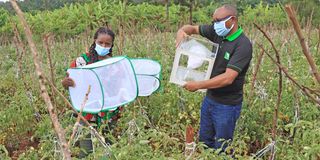Wasps show better prospects in Tuta absoluta fight

Peter Ndiritu a researcher from the International Centre of Insect Physiology and Ecology (Icipe) releases wasps which are a natural enemy to Tuta Absoluta on a farm in Kirinyaga County.
What you need to know:
- Icipe has imported the wasps from Peru, in South America, which is the native home of the pest.
- The wasps were first introduced on farms in Kirinyaga County, and more releases are planned in other major tomato-growing regions in the country, according to Icipe scientists.
- The tiny Tuta absoluta caterpillars damage tomatoes by tunnelling into leaves and eating the green parts, causing the leaves to dry out; and also burrowing into the fruits, resulting in deformities and rotting.
Scientists at the International Centre of Insect Physiology and Ecology (Icipe) have released wasps on farms to fight Tuta absoluta, a destructive tomato pest that is ravaging the crop across the country.
The pest was first detected in Africa in 2008 and has since spread rapidly across the continent.
Icipe has imported the wasps from Peru, in South America, which is the native home of the pest.
Known scientifically as Doligochenidea gelichiidivoris, the wasp controls Tuta absoluta by laying its eggs inside it. The eggs later emerge as adult wasps thereby killing the larvae of the pest.
“The introduction of a natural enemy for Tuta absoluta is especially significant in view of enabling Africa tackle the rising threat of invasive species, and their dramatic effect on agriculture and livelihoods across the continent,” said Sunday Ekesi, the Director of Research and Partnerships, at Icipe.
Fast reproduction rate
The wasps were first introduced on farms in Kirinyaga County, and more releases are planned in other major tomato-growing regions in the country, according to Icipe scientists.
The general manager, phytosanitary services at the Kenya Plant Health Inspectorate Service, Isaac Macharia, said Icipe received regulatory support for the importation and release of the natural enemies to manage Tuta absoluta. ,
“One of the main challenges in the control of Tuta absoluta is its fast reproduction rate, with many generations emerging per year. As such, the pest quickly develops resistance to major pesticides,” Samira Mohamed, a senior scientist at Icipe, notes.
The tiny Tuta absoluta caterpillars damage tomatoes by tunnelling into leaves and eating the green parts, causing the leaves to dry out; and also burrowing into the fruits, resulting in deformities and rotting.




